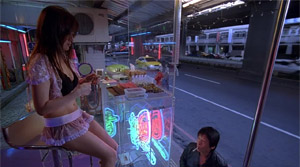

Tian Zhu Ding
Taiwan 2007
Genre:
Drama
Director:
Lee Kang-sheng
Cast:
Lee Kang-sheng
Ivy Yin
Liao Hui-Jen
Dennis Nieh

Help Me, Eros
Story: Ah Jie (Lee Kang-sheng) has lost his job and all of his money. While he was making the big bucks through stock exchange he now can't even
afford a pack of cigarettes. He lives in an apartment that has actually already been seized and he grows cannabis. He smokes his own product whenever he can
and tries to deal with reality as little as possible that way. But then he gets to know the girl Shin (Ivy Yin) who works at a kiosk below his apartment,
like her colleagues serving her customers with only little cloth on. Ah Jie may befriend her, but he isn't interested in a real relationship. Instead he
keeps smoking dope and calling Chyi (Liao Hui-Jen), who works for a suicide hotline and has her own share of problems at home. Her husband doesn't pay any
attention to her and keeps the marriage alive by cooking for her. Thus, her excess weight is a serious problem for a while aleady. Ah Jie hopes for some
kind of salvation, but he isn't the only one plagued by a certain longing and loneliness...
Review: "Help Me, Eros" without a doubt aims at an audience that has a soft spot for art house cinema. The slow pacing and the somewhat
odd narrative are clear evidence. Next to that there is only little dialogue, instead you need to draw your own conclusions based on the actions of the
individuals. In other words, you need to spend some effort if you want to get as much as possible out of the drama. The film manages to convince with an
outstanding cinematography and a mood of loneliness and solitariness that you don't see transfered to screen that well very often. In fact the drama
doesn't feel as cold and distant like similar works, yet manages nicely to bring to screen the feeling of being lost in a world in which the reason for
existence has disappeared.

It also isn't easy to pinpoint on which individual the focus lies on in "Help Me, Eros", although it apparently is to be looked for in Ah Jie. The lives of
the three individuals overlap on several occasions and the characters share the same problem: love. But that's exactly where you can't be really sure. Because
even though the title itself already hints at love being the pivot of the story you can't truely tell that Ah Jie is really looking for it. His loneliness may
be all-consuming and he also has some sort of longing, but it is more of a longing for his former life as a successful businessman. Maybe he unknowingly realizes
that he might have found someone in Shin who could give his life meaning again - there are a few signs for that -, but he soon destroys this chance
of salvation completely.

Reason for that is his escape into drugs. He isn't physically addicted to pot, but mentally. And what he could have had with Shin he instantly gambles away
by having sex with other women under the influence of drugs, yet fully being aware of what he is doing, and not even trying to keep it a secret from Shin.
There can be found quite a few explicit scenes in "Help Me, Eros". Maybe this is also the influence of Tsai Ming-liang who has co-produced the film and
himself shocked critics in this respect with his "The Wayward Cloud". Furthermore, his involvement could also be the
reason for at least one scene in which the kiosk girls lasciviously lounge around as if they were shooting a small music clip for the song that is played.
Still, this particular scene seems somewhat unmotivated in the movie.
While we get to know at least a few things about Ah Jie, Shin somehow remains a blank sheet. You never really know what to make of her character. Chyi, the
woman from the suicide hotline, has far less time on screen, yet seems a lot more interesting. She is plagued by loneliness herself since her husband doesn't
touch her anymore - obviously he actually wants to be a woman or he is simply gay - and instead cooks for her. But despite all the dishes her longing remains
unanswered. Her physical desire as well, which is why she even lies down in a bathtub with snakes in it... Yes, sometimes "Help Me, Eros" is deliberatly
provocative. Especially in the beginning when we see a living fish being served or later on when an ostrich egg is supposed to be fried, but instead a dead
ostrich falls out of the egg.

A real treat for the eyes are the pictures which give the neon-lit streets something warm and almost homey, although they easily could have felt cold. The sex scenes are implemented well, too, even though there is something sinister about them since they are merely desperate and certainly not promising attempts to escape loneliness. A scene of Shin standing in a shower of lottery tickets with some angel wings strapped to her back is particularly enchanting. Moreover, some pictures are fraught with more meaning than the few lines of dialgoe in the film and create an appaling atmosphere, that is if you like delving into a depressive mood. Ultimately, Lee Kang-sheng, who also takes on the lead role, proves to have talent as a director. However, it still needs to be pointed out that the movie has too little structure narratively and will mainly appeal to art house fans because of its slow pacing and the many scenes in which on the one hand barely something happens or which on the other hand are very provoking.

Disclaimer

















